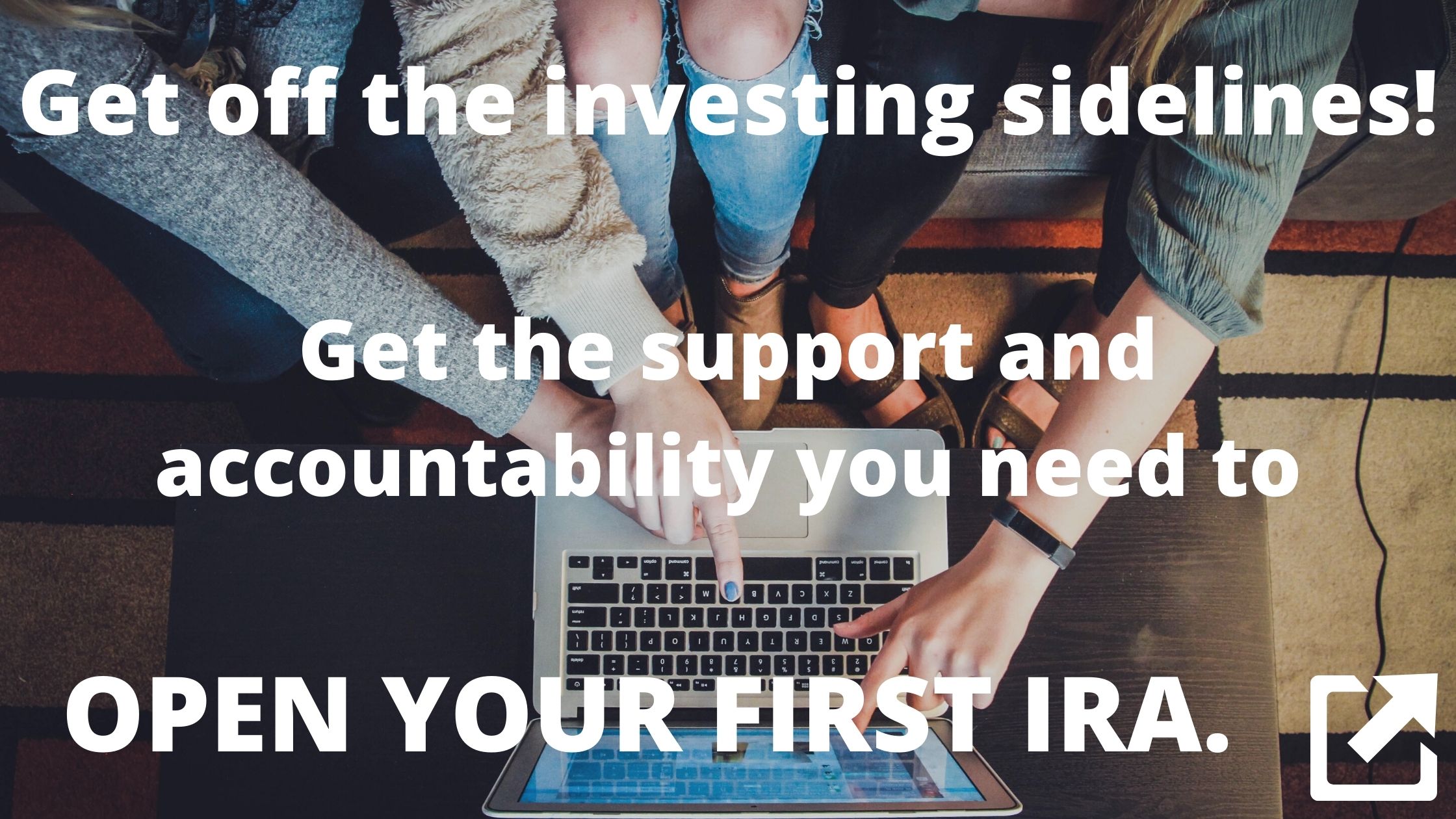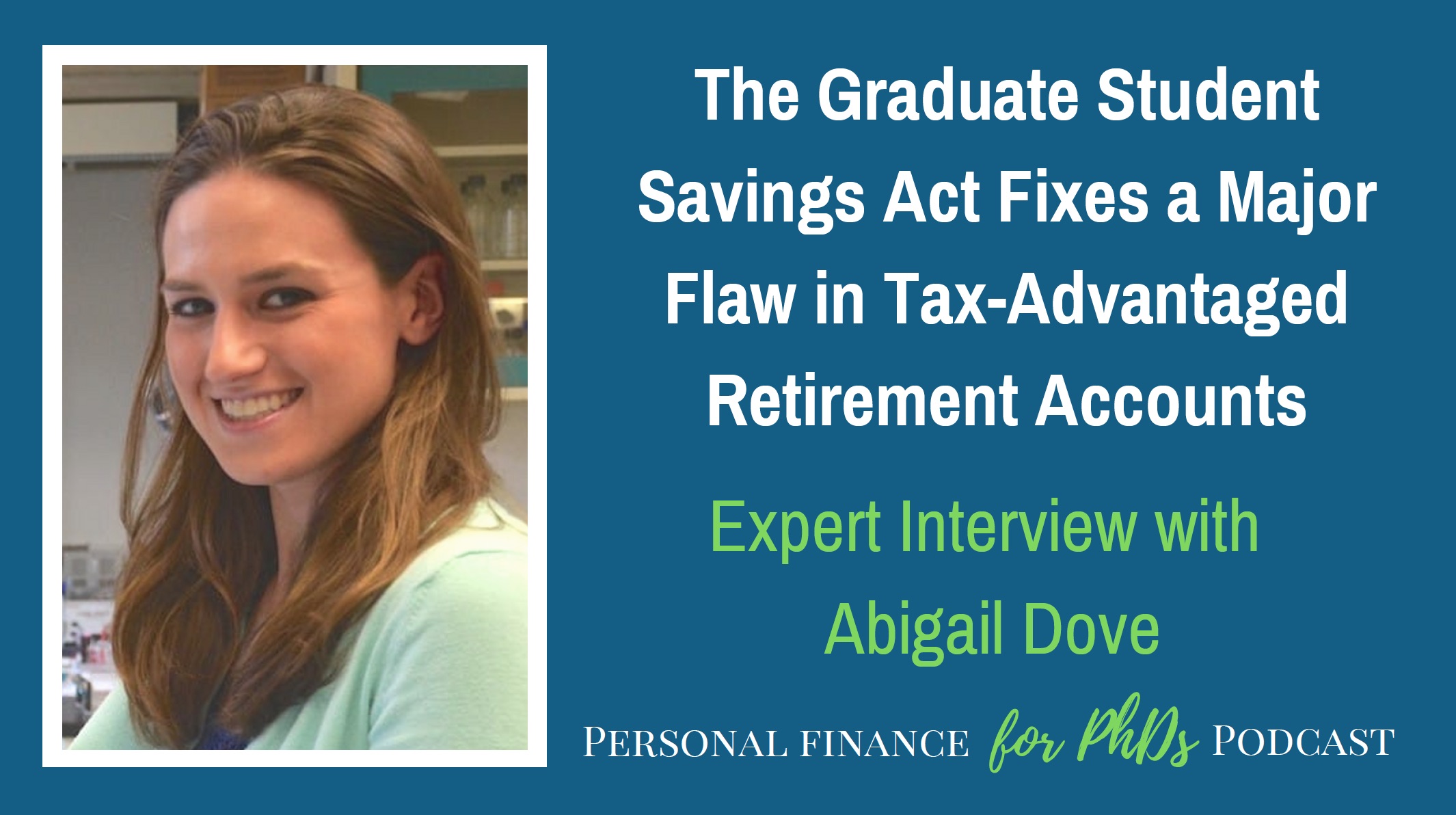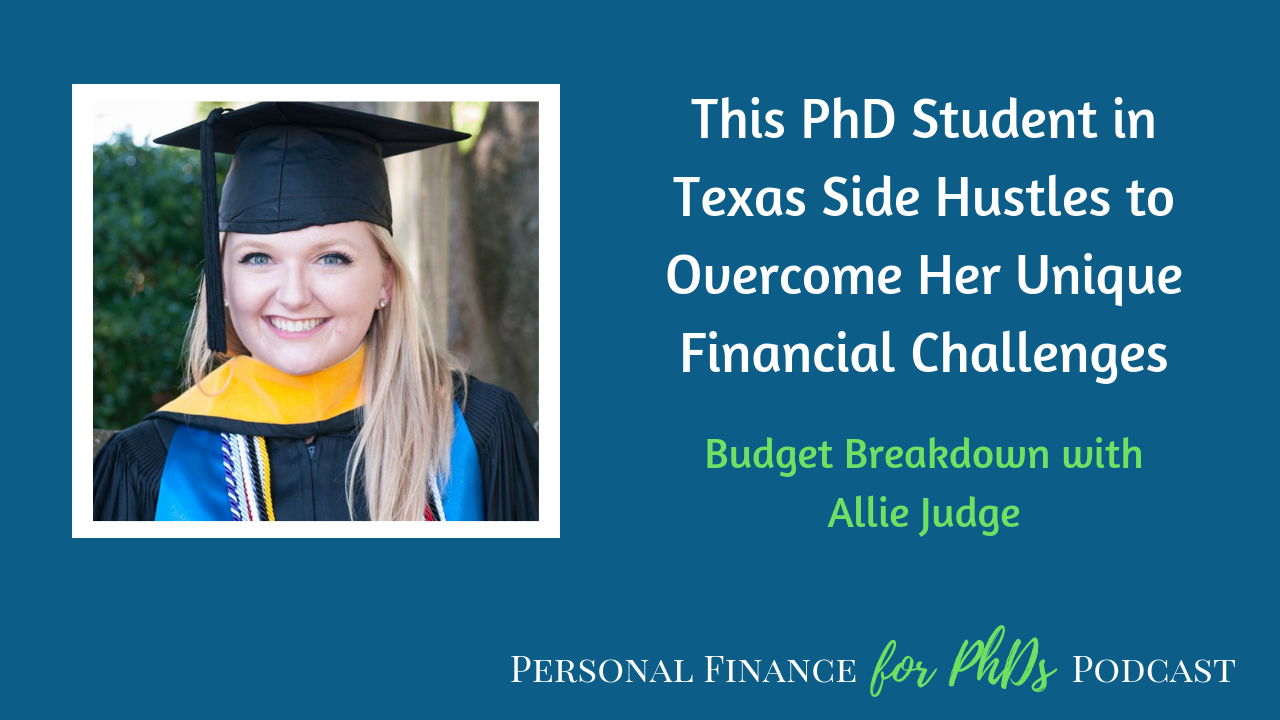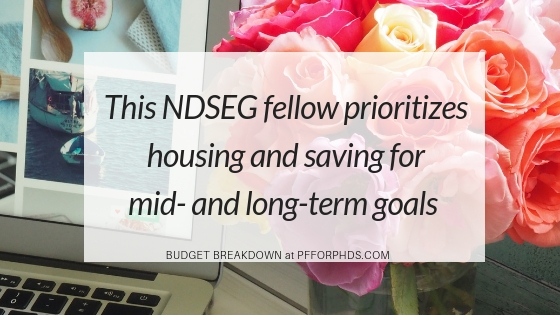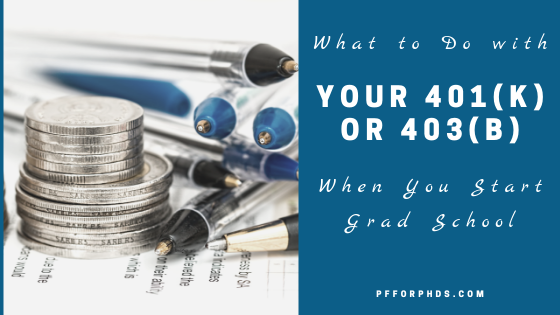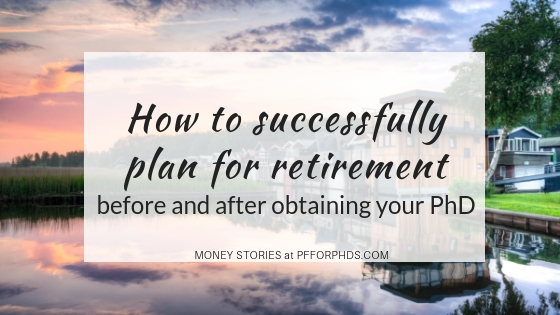In this episode, Emily interviews Abigail Dove, a PhD student at Johns Hopkins. Abby spent last summer as a science policy fellow at the Federation of American Societies for Experimental Biology (FASEB). Her major policy accomplishment during her internship was to secure FASEB’s endorsement of the Graduate Student Savings Act of 2019 (GSSA), a bill that has been proposed in both chambers of Congress. Graduate students and postdocs are not currently permitted to contribute their non-W-2 income, which typically comes from fellowships and training grants, to Individual Retirement Arrangements (IRAs). The GSSA would allow this type of income to be contributed and have a very beneficial effect on the PhD trainee workforce. Abby explains her role in shepherding the GSSA endorsement through FASEB, what the GSSA would do for graduate students and postdocs, and how the GSSA relates to the SECURE Act, another bill that has passed the House and is before the Senate.
Links Mentioned in the Episode
- FASEB Webinar on Work-Life Balance
- GSSA – House Bill
- GSSA – Senate Bill
- Personal Finance for PhDs: Schedule a Seminar
- FASEB Statement on GSSA
- SECURE Act
- Personal Finance for PhDs: Podcast Hub
Teaser
00:00 Abigail: But it was a little tricky for FASEB to first navigate the waters. They’ve never supported a tax legislation before. You think that experimental biology doesn’t have that much to do with legislation on tax. But here was a perfect one for them to start.
Introduction
00:22 Emily: Welcome to the Personal Finance for PhDs podcast, a higher education in personal finance. I’m your host, Dr. Emily Roberts. This is season four, episode nine and today my guest is Abigail Dove, a PhD student at Johns Hopkins and recent science policy fellow at FASEB, the Federation of American Societies for Experimental Biology. Abby’s major policy accomplishment during her summer at FASEB was to secure FASEB’s endorsement of the Graduate Student Savings Act of 2019, or GSSA, a bill that has been proposed in both chambers of Congress. Graduate students and postdocs are not currently permitted to contribute their non-W2 income, which typically comes from fellowships and training grants to individual retirement arrangements or IRAs. The GSSA would fix that problem and have a very beneficial effect on the PhD trainee workforce. Abby explains her role in shepherding the GSSA endorsement through FASEB, what the GSSA would do for graduate students and post docs, and how the GSSA relates to the Secure Act, another bill that as of this recording has passed the House and is before the Senate. Without further ado, here’s my interview with Abigail Dove.
Will You Please Introduce Yourself Further?
01:33 Emily: I have joining me on the podcast today, Abigail Dove, and she is a PhD student who completed an internship at FASEB last summer. And she has a lot to tell us about the Graduate Student Savings Act. So if you have been wondering about your IRA and why you can or cannot contribute to it, that’s what we’re going to be discussing in today’s episode. Abby, thank you so much for joining me today and will you please introduce yourself a little bit further?
01:59 Abigail: Sure. Thanks for having me. My name is Abigail Dove. Currently, I’m a PhD student at Johns Hopkins and I just started my sixth year. I work in fruit flies and study the gonad development. A little bit of my background: I first started as an undergraduate at Bard college, a small liberal arts school in upstate New York. And then I did a postbac for two years at the NIH NIDDK (National Institute of Diabetes and Digestive and Kidney Diseases) before starting at Hopkins. What we’re talking about is kind of the work that I did at my internship at FASEB, which is the Federation of American Societies for Experimental Biology, which I guess to be a little more descriptive it’s a society that represents 29 member societies, which has about 150,000 scientists that they represent.
Tell Us More About Your FASEB Internship
02:57 Emily: Excellent. You and I have common that we both did a postbac at the NIH. In fact, I’ve interviewed several other people on the podcast who have that on their resumes as well. So very popular program. Anyone still in college considering going for a PhD in biomedical sciences or related areas should definitely consider the NIH postbac program. It’s amazing. Okay. So you had this internship at FASEB last summer. What exactly were you doing in that role? Because it’s a little bit unusual for a graduate student to have an internship. And I think especially a graduate student in the biological sciences because, I don’t know about you, but I sort of observe the culture as like, “ah, you need to stay at the bench 120% of your time and never do anything away from the bench.” So please tell us a little bit more about what you were doing in that internship.
03:40 Abigail: Yeah, so I was really fortunate. I have a PI that–we both know that I’m interested in a career that is outside of the academic track. So, I did a lot of science outreach and I knew that I like communicating science to the public. So I wanted to pursue this career of science policy as a way to talk to the public about science and its importance. So what I did at FASEB, I had a lot of responsibilities. I was particularly interested in training and workforce policy. So, policy that relates to students, postdocs, and even faculty as it’s something that everyone can relate to. So that was one of the reasons that I was most interested in it. And I did a wide range of things. I hosted a webinar on work-life balance and the lab culture and we can include a link to that if anyone wants to watch it later. I represented FASEB on Capitol Hill and at the NIH for different events and I generated comments on sexual harassment that will soon be sent to the NIH. I also helped organize an online symposium series for the FASEB Science Policy Committee on challenges facing women throughout their career lifetime. And then I compiled minutes for the meetings, I drafted talking points for committee members, and then the big thing that I did was I spearheaded FASEB’s endorsement of the Graduate Student Savings Act.
How to Land a Science Policy Internship
05:13 Emily: Excellent. And we’ll get a lot more into that in a moment. But that sounds like a really exciting internship. It’s absolutely fabulous that your PI was supportive in you completing that. I actually did a science policy internship as well. The Mirzayan Policy Fellowship out of the national academies. That was actually after I finished graduate school. But it’s available to current graduate students as well. So, if what Abby was describing sounds amazing to you, that’s another potential avenue for you to get that kind of experience in science policy. Okay. So how did you actually land this internship if other people are interested in doing something similar?
05:46 Abigail: Yeah, so I first started–we have an office at Hopkins, it’s called the Biomedical Careers Initiative Office. And it’s really great for people that are looking for careers outside of the academic track. They were offering a course on science policy and advocacy that was actually being taught by the Director of Public Affairs at FASEB, Jennifer Zeitzer, and the Director of Science Policy, Dr. Yvette Seger. So the class gave us a background on legislation and how bills get enacted into law. And we did some case studies on different issues in science policy. They also taught us how to be a science advocate. But finally, we had to write a policy memo on an opportunity or challenge in research activities supported by federal funding, and we had to give an elevator pitch on that to the class as well. And I did mine on saving for retirement as a graduate student and a postdoc.
06:48 Emily: Yeah. Excellent. And so was it through that paper and that pitch that you gave that you found the Graduate Student Savings Act?
06:56 Abigail: Yes, that’s how I found it. Oh, I guess we didn’t cover how I got the position too. So this office that hosted the class actually also hosts internships for students. And so FASEB was also accepting applications for science policy fellows through the Biomedical Careers Initiative Office. So I applied for that directly. But they also have internships for a wide range of different careers outside of the academic track, including industry and consulting and patent law as well as policy.
What is the Graduate Student Savings Act?
07:33 Emily: It sounds like a great deal of support actually, that Hopkins is providing and helping you sort of step a little bit outside of academia into another role that can really presumably help your post-PhD career, should you decide to pursue one in science policy. So let’s kind of back up a second and explain more about what the Graduate Student Savings Act is because it’s probably not one that most people have ever heard of. Right? Like probably a lot of people in my audience, they know about IRAs. Maybe they don’t have one, but they sort of know they’re supposed to or maybe they know they might not be able to have one. So what is the Graduate Student Savings Act?
08:06 Abigail: Yeah, so the Graduate Student Savings Act. There’s a bill in both the House and the Senate and they’re essentially the exact same bill, so they’re called companion bills. And they would allow graduate students and postdocs who receive their income through either a fellowship or stipend to contribute to an IRA or an individual retirement account. The current issue right now is that on the current tax law, trainees who are receiving their income through a fellowship or a stipend are actually prohibited from contributing to an IRA because it’s not considered compensation or earned income.
08:44 Emily: Exactly. And I like to further kind of clarify this for people by saying within academia we might use the word fellowship in different ways. We might use the word stipend in different ways. Nobody’s ever heard the word compensation. But what it really boils down to is, is your graduate student or postdoc income reported on a W2 or not reported on a W2? It could be reported somewhere else, it could be reported not at all. W2 income is the kind of income, taxable compensation, or earned income that can be contributed to an IRA under the current law. And anything else in terms of graduate student, postdoc income non-W2 does not fall into that category, unfortunately. So that’s how things currently stand. The Graduate Student Savings Act includes this type of non-W2 or fellowship income in taxable compensation for the purposes of contributing to an IRA. Is that correct?
09:39 Abigail: Yes. And unfortunately, it doesn’t change its designation universally. It doesn’t make it earned income or compensation, but it just allows it to be saved for retirement purposes in an IRA.
09:51 Emily: Yeah. This is one of those confusing things about the tax code in general is that they use these terms like “taxable compensation” and “earned income” under different contexts. And so sometimes they have different definitions under different contexts. So earned income has other implications in the tax code, like around the earned income tax credit. Whereas, taxable compensation has a different meaning. It’s under the section for IRA contributions and so forth. So it’s sort of defined there as “taxable compensation for the purposes of contributing to an IRA is these things,” and currently, it says explicitly, “does not include fellowship income, not reported on a W2.” So that’s the current status. But then there’s this Graduate Student Savings Act bill as you said, it’s sort of on the floor in both the House and the Senate.
How Abby Got FASEB to Endorse the GSSA
10:37 Emily: I was looking at the history of this and I think the first time it was introduced was 2016 and it’s introduced every year I think in more or less the same form until now, 2019. We should actually say we’re recording this interview on September 25th, 2019. It will be released within a couple of weeks of that date. So things might have changed. But as of September 25th, 2019, the Graduate Student Savings Act has not been passed but it is, I guess, available to be passed. So, what was the process like for getting FASEB to ultimately endorse the Graduate Student Savings Act, and what work did you do to make that happen?
11:15 Abigail: Yeah, so originally before I even did the class, FASEB was not aware of the Graduate Student Savings Act at all. It wasn’t on their radar. It wasn’t until I wrote my policy memo on the issues of graduate students saving for retirement, and I actually did the research and I was just Googling it and I came across it on my own, that we both kind of became aware of it. And so I kind of took this on as a task that I wanted to complete in my fellowship and I thought it was an important task and FASEB was great. If there was an issue that I really wanted to take on and it was something that was good for FASEB to endorse, they would have no problem with me taking the lead. So this was my big accomplishment of the fellowship.
12:04 Abigail: And since FASEB is a nonprofit organization any bill that they support needs to have bipartisan support for endorsement. And that thankfully both the House and Senate bill had bipartisan support on both pieces of legislation. I think some of the previous iterations of the Graduate Student Savings Act didn’t have bipartisan support. So this was really important for FASEB to get on board. But it was a little tricky for FASEB to first navigate the waters. They’ve never supported a tax legislation before. You think that experimental biology doesn’t have that much to do with legislation on tax. But here was a perfect one for them to start.
Personal Impact of Flawed Tax Legislation
12:49 Emily: Yeah. As you were saying earlier, it’s a clear workforce issue. Right? So that’s the definite connection or conduit between what they do generally and this weird little tax quirk that happens to deeply affect their own workforce.
13:03 Abigail: Well, yes. So this actually personally affected me. From when I was in college and doing other side jobs, I was always contributing to an IRA, if possible. My dad is very financially responsible and he just told me when I was young, “you need to have an IRA.” He always recommended a Roth IRA. He always thought it would be better to get tax first and any profit you make later you don’t get taxed on. So there’s two different IRAs, a Roth and the standard IRA. So maybe some clarity on that. But this personally affected me when I was a post-bac for those two years I was receiving stipend income and wasn’t reported on a W2 so I couldn’t contribute to an IRA for those two years.
13:51 Abigail: Then my first year in graduate school I was on a training grant, so also not receiving a W2 so I couldn’t contribute. My second year I was actually a teaching assistant, so I was being employed by the university somewhat and getting my income reported on the W2. So I was for that year able to contribute, which was really great. And then I got awarded the National Science Foundation, Graduate Research Fellowship award.
14:20 Emily: Congratulations, but also, dun, dun, dun.
14:23 Abigail: Yeah. So it was really great. But then I also couldn’t contribute to my IRA because it wasn’t reported on a W2. So that affected me for my third and fourth year of graduate school. My fifth year I got married. So that changed things a little. I was still on my NSF fellowship. But because I was married to someone who had a real job and was receiving income that was deemed compensation, I was able to contribute to my Roth IRA just because I was married to my husband. so that was my last year of my fellowship. Now I’m back at Hopkins and I’m TA’ing for this year. So I will again be able to contribute even if my husband wasn’t receiving earned income himself.
15:14 Emily: Yeah, I have a little bit of a similar story of flip-flopping between RAs and fellowship income. And at some point I got married and so my husband, having a similar situation of flip-flopping between RAs and fellowship income, it helped in certain years one of us would have a taxable compensation, maybe the other one wouldn’t. So one of the things that helps people in this situation–under the current status of fellowship income, non-W2 income is not eligible to be contributed to an IRA–one thing that helps is that the academic year and the calendar year do not line up. So, if you have different sources of funding in two different academic years, maybe you can be covered for one calendar year in terms of being able to contribute. It helps if you’re married of course, to someone with taxable compensation. And the other workaround is actually having a side hustle that is self employment income. So self-employment income is taxable compensation that can be contributed to an IRA. So that’s something I sometimes float with people who are frustrated by their multi-year wonderful fellowship packages that don’t allow them to contribute to an IRA. If it’s possible to side hustle, that’s another way to kind of sneak in that eligibility. So, your stipend wouldn’t be eligible, but that side hustle income would be eligible. All these are workaround solutions, the real main solution is just changing the tax code because this is ridiculous that this is happening, right?
Commercial
16:35 Emily: Emily here for a brief interlude. Through my business, I provide seminars and webinars on personal finance for graduate students, postdocs, and other early-career PhDs for universities, institutes, conferences, associations, etc. I offer seminars that cover a wide range of personal finance topics and others that take a deep dive into the financial topics that matter most to PhDs, like taxes, investing, career transitions, and frugality. If you are interested in having me speak to your group or recommending me to a potential host, you can find more information and ways to contact me at pfforphds.com/speaking. That’s p f f o r p h d s.com/speaking. Now back to the interview.
Anything Else About Your Role in FASEB?
17:25 Emily: Okay. So, anything else to add about your role with getting FASEB to endorse the GSSA?
17:31 Abigail: Yeah. So, because it was a tax bill and FASEB had never endorsed a tax bill before, they want it to go through full process of endorsement. They wanted to get everyone’s feedback on it. So the first step was going through their Training and Career Opportunities Subcommittee. So, they have a monthly meeting, I prepared talking points for the chair of that committee, and we discussed it and they couldn’t see anything wrong with it. So, we got a full endorsement from that subcommittee. Then we had to go up one level to the Science Policy Committee and did the same thing, had to talk to the entire committee, got overwhelming support of it. So, it got pushed up to the next FASEB tier, which was the executive committee. They gave the final approval. Actually, for the Training and Career Opportunities Subcommittee and the Science Policy Committee, I made a one-page summary of the current situation and how the Graduate Student Savings Act would change that. So, a one-page review for them. And then when we went for approval for the Executive Committee, we had the full letter drafted for them to approve, and we can also give you a link to the FASEB’s endorsement letter too, as well.
18:56 Abigail: Normally, it would go to the FASEB board for approval, but the board was jam-packed with what they had to do for that month. So, because we got unanimous support from the two committees before that, they thought that the Executive Committee approval would be sufficient. But I started my internship in June and it wasn’t approved until the first week of September. So, it does take a long time for this approval to go through because you have to wait every month for the next committee to happen. And if there are changes and edits to it, then it can also take a lot of time. You want to do it as quick as possible so the endorsement actually has an effect if the bill is getting voted on soon.
19:47 Emily: Yeah, exactly. This is fascinating to hear kind of how the sausage is made, and not even to make the policy, but just to get something like this: an endorsement from group whose endorsement matters in this kind of thing. What I’m just thinking is how good it is that FASEB has connections to the current trainee workforce like through you and other interns they accept because they had you to tell them, “Hey, this is an issue that’s going on. And by the way, there’s a solution to it and it’s in front of Congress right now.” So it’s just, I guess it’s really good for them to offer these kinds of internships programs to get those fresh ideas and those connections to people who are still in training.
20:30 Abigail: Yeah, I think they really appreciate the fellowship program for that same perspective. The younger generation. People serving on these committees and the boards are faculty members that have been serving for a while and they’re very removed from this training portion. I think there might be–and correct me if I’m wrong–but I think there could be a few postdocs who are serving on boards, but I think that’s very unlikely. Most of it’s always faculty. There’s never a postbac representative in these meetings. So, having a fellow there, they really value so they can get that younger perspective on what’s happening currently.
What is the SECURE Act?
21:10 Emily: Yeah. That’s excellent. Okay. So that was your role with FASEB and then with respect to the GSSA, the Graduate Student Savings Act. There is a different bill before Congress that has sucked up a lot more attention in terms of changing the tax code than the GSSA has, and that is the SECURE Act. Can you tell us what the SECURE Act is? Not in a lot of detail, but basically just how it relates to the Graduate Students Savings Act?
21:35 Abigail: The SECURE Act is Setting Every Community Up for Retirement Enhancement Act of 2019, and it’s just a massive retirement savings bill. For some perspective, the Graduate Student Savings Act is a two-page bill, whereas the Secure Act is 124 pages. So it’s just way too large for FASEB to endorse something so big. But fortunately, it has almost the exact same wording as the Graduate Student Savings Act in one of its sections. So it would get across the same thing as the Graduate Student Savings Act. It would allow graduate students receiving unearned income to contribute to an IRA account. It just was too big of a bill for FASEB to endorse because we can’t vet everything and it’s a little bit out of FASEB’s wheelhouse.
22:22 Emily: Yeah. So, basically what sounds like has happened is that the Secure Act has absorbed the Graduate Student Savings Act pretty much verbatim. And it’s making a lot of other changes as you said to retirement accounts. I’ll link to a couple articles on the Secure Act from the show notes, but some other things that caught my eye that it’s trying to address are like having part time workers have more access to 401k’s. It’s changing a little bit of the distribution rules, like once you’re actually in retirement and about inherited IRAs and there’s just a lot of changes there. Abby and I were glancing over it and we saw something that, “Oh maybe this addresses the kiddie tax.” We’re not even sure about that, which would be amazing if it does. So there’s a lot of different things that it touches.
23:02 Emily: And as you were saying earlier, like for FASEB being able to endorse the GSSA, the GSSA had to have bipartisan support. In fact the Secure Act does have bipartisan support. It passed the House and is currently hung up in the Senate as of, again, September 25th. Because the Secure Act passed the House with such strong bipartisan support, everyone kind of thought that it would pass the Senate really quickly. But it’s been hung up, so its future is uncertain but hopefully it will get through. And the wording that was adopted from the GSSA, hopefully that would actually be maintained. And in the final version we would actually see this benefit be extended to graduate students and postdocs where it wasn’t before. But that’s kind of where things stand as of today as of this recording. Hey, maybe by the time this is published something will have changed on that front. That would be awesome.
23:56 Abigail: I think something also important to note is that the wording of the bill, I don’t think that it would also apply to postbacs. It seems very specifically to graduate students and postdocs. So I think, unfortunately, postbacs would be still excluded from the Graduate Student Savings Act.
How Will the Internship Help Your Future?
24:12 Emily: Hmm. Interesting. Yeah. I’ll have to take a look at that because I didn’t realize there were distinctions being made among different levels of training. We’ll see how that actually shakes out. It’s always sort of uncertain until kind of the next tax cycle rolls around how these things are actually going to be implemented and everything. Thank you for pointing that out. For postbacs out there, this might not be the news you’re looking for. Maybe you still need the side hustle or maybe you still need to get married to have one of these workarounds. Just kidding, people don’t do that. Okay. So Abby, how do you think that this internship experience with FASEB is going to benefit your future career?
24:52 Abigail: Oh, I think it benefited me already tremendously. Besides from just getting a sense of what science policy really is and getting to immerse myself in it and what I would expect in a job. I got great networking. I already met a bunch of people because FASEB represents so many other societies. You know, I really got to get my name around and people know my work now. I also just got a ton of experience. I generated a bunch of writing samples, which is really crucial in the science policy job search, and I think I’ll get great references also for future jobs. So, it’s benefited me tremendously.
25:30 Emily: Do you have specific plans yet for after you finish? Like what positions you might apply for?
25:35 Abigail: Yes, I’m probably looking for science policy analyst positions. When I graduate. I don’t see really any benefit of doing a postdoc afterwards. There are people that continue to do more science policy fellowships. I’m kind of in the boat where I would just like to be out of fellowships and schooling and just want a real job. And I think with this internship I generated enough experience that I would be able to get an entry-level position and be a sought-after candidate.
Final Advice for Early-Career Grad Students
26:08 Emily: Yeah, I have a great deal of sympathy with that position of, “okay, I don’t need any more training. I’m trained. Let me have a job. Finally.” Definitely. So Abby, last question here, which is one I ask all of my guests. What is your best financial advice for another early-career PhD? And that could be related to something we’ve talked about today or it could be something entirely different.
26:29 Abigail: Yeah. So I think of course I would recommend that everyone should open and save in a Roth IRA account and start saving what they can, even if they can’t hit the max. But I think more importantly, we know that graduate school is a really stressful time, and I think it’s really important to invest in your personal wellbeing. And so if that means, paying for workout classes or traveling or if it’s even retail therapy. I think whatever it is, if it’s important to you and if it makes grad school a little bit saner for you it’s important to put some money aside and make time for yourself.
27:08 Emily: Yeah, it’s, it’s actually a little bit weird that sometimes we have to give graduate students permission to spend money on themselves. But if you think about it like more broadly, other people when they receive the financial advice to cut back on those discretionary expenses, cut back on those Wants and so forth, it’s usually because they’re spending at such a level that’s actually endangering their other financial security.
27:35 Emily: Graduate students I would say in general are not spending a sufficient percentage of their income on discretionary things for themselves. Actually, sort of to tie this back to the GSSA, one of the co-sponsors of the GSSA is Senator Elizabeth Warren. She’s sponsored every year in the past, whatever, four years that it’s been up. Many years ago, back when she was a consumer advocate, basically, she wrote this book called All Your Worth*. She co-authored it with her daughter. And that book promotes the balanced money formula, which is to spend, of your after-tax income, no more than 50% of your after-tax income on Needs, 30% on Wants and 20% to Savings. And I was looking at that the other day and I’m thinking that graduate students, I would be surprised if they spent 30% of their income on their Wants.
[* This is an affiliate link. Thank you for supporting PF for PhDs!]
28:28 Emily: Usually, it’s that Needs category that gets up to 60, 70, 80% or more because of rents and high costs of living areas and low stipends and all of those kinds of problems. So yeah, in fact, sometimes we do need to hear the advice that it is okay to spend a little bit of money on yourself to help bolster your mental health and help you get through graduate school in great shape. Of course, it’s ideal if you can do that alongside saving for your future and doing all these other great things, but we want you to get through graduate school in one piece. So yeah, thank you for that advice, Abby, and for giving this interview today.
29:02 Abigail: Well, thank you for having me.
Outtro
29:05 Emily: Listeners, thank you so much for joining me for this episode. Pfforphds.com/podcast is the hub for the Personal Finance for PhDs podcast. There, you can find links to all the episode show notes, a form to volunteer to be interviewed, and a way to join the mailing list. I’d love for you to check it out and get more involved. If you want to support the show and my business, please go to pfforphds.com/helpout. There are plenty of ways to do so without laying out any of your own money. See you in the next episode! And remember, you don’t have to have a PhD to succeed with personal finance, but it doesn’t hurt. The music is Stages of Awakening by Podington Bear from the free music archive and is shared under CC by NC.
